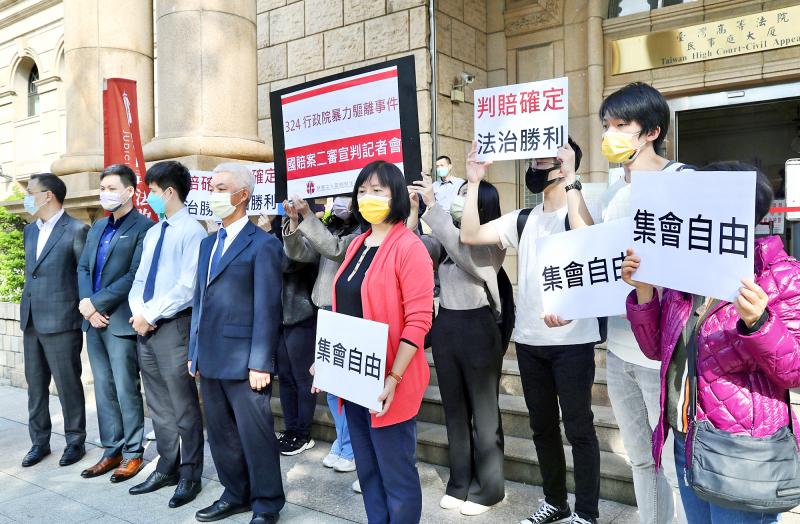The High Court yesterday ordered the Taipei City Police Department to pay NT$1.41 million (US$50,708) in total compensation to 15 protesters injured during an occupation of the Executive Yuan complex in 2014.
Department officials said they respect the court’s decision, but expressed regret over the financial burden, saying the police officers were only doing their duty when they removed the Sunflower movement protesters from “illegally” occupying government premises.
The compensation was an increase from the first ruling by the Taipei District Court in 2019, when the department was ordered to pay NT$1.11 million to 10 protesters in a lawsuit filed by 29 people who said they suffered varying degrees of injuries due to the use of excessive force by police.

Photo: CNA
The 29 protesters, the police department and the Taipei City Government appealed the decision.
Among them was then-Taiwan Solidarity Union legislator Chou Ni-an (周倪安), who told reporters after the High Court’s verdict that she had gone to the Executive Yuan, in her capacity as a lawmaker, to protect the protesters.
The ruling cited testimony and evidence that police had used excessive force to evict the demonstrators, with 15 of the protesters presenting medical records showing bone fractures, bruises to the head and body, and other injuries.
Lawyers for the protesters presented video footage showing several police officers using shields and batons to beat them, as opposed to statements by top police officials that the officers had been “gentle” in removing the arm-locked sit-in protesters.
Chou said she had been awarded NT$200,000 in compensation in both rulings, while other protesters received between NT$60,000 and NT$120,000, but they are little compared with the mental anguish, physical pain and financial burden that they went through.
“It is not a satisfactory result, for our litigation to end in state compensation. The top officials who instructed police officers to beat us were not held liable and did not receive any punishment,” Chou said. “Some were even promoted.”
Lauding the ruling, the Judicial Reform Foundation said in a statement: “This ruling rejected the appeal by the police and the Taipei City Government, and upheld the main decisions of the district court... It represents victory, as justice has prevailed.”
“However, we regret to say that after nearly eight years, the judicial investigation failed to identify any of the police officers who had used excessive force to assault the protesters, and none of them received any punishment or were prosecuted,” it said.
“We believe this case can show that citizens have the right to gather to protest, in a collective will against government policies, which helps to safeguard Taiwan’s freedom and democracy... We hope that the result of the litigation serves as a warning to state authorities against abusing the public,” it said.
The police or city government cannot appeal the ruling, but the protesters can still launch an appeal for higher compensation.
Additional reporting by CNA

CHAOS: Iranians took to the streets playing celebratory music after reports of Khamenei’s death on Saturday, while mourners also gathered in Tehran yesterday Iranian Supreme Leader Ayatollah Ali Khamenei was killed in a major attack on Iran launched by Israel and the US, throwing the future of the Islamic republic into doubt and raising the risk of regional instability. Iranian state television and the state-run IRNA news agency announced the 86-year-old’s death early yesterday. US President Donald Trump said it gave Iranians their “greatest chance” to “take back” their country. The announcements came after a joint US and Israeli aerial bombardment that targeted Iranian military and governmental sites. Trump said the “heavy and pinpoint bombing” would continue through the week or as long

TRUST: The KMT said it respected the US’ timing and considerations, and hoped it would continue to honor its commitments to helping Taiwan bolster its defenses and deterrence US President Donald Trump is delaying a multibillion-dollar arms sale to Taiwan to ensure his visit to Beijing is successful, a New York Times report said. The weapons sales package has stalled in the US Department of State, the report said, citing US officials it did not identify. The White House has told agencies not to push forward ahead of Trump’s meeting with Chinese President Xi Jinping (習近平), it said. The two last month held a phone call to discuss trade and geopolitical flashpoints ahead of the summit. Xi raised the Taiwan issue and urged the US to handle arms sales to

State-run CPC Corp, Taiwan (CPC, 台灣中油) yesterday said that it had confirmed on Saturday night with its liquefied natural gas (LNG) and crude oil suppliers that shipments are proceeding as scheduled and that domestic supplies remain unaffected. The CPC yesterday announced the gasoline and diesel prices will rise by NT$0.2 and NT$0.4 per liter, respectively, starting Monday, citing Middle East tensions and blizzards in the eastern United States. CPC also iterated it has been reducing the proportion of crude oil imports from the Middle East and diversifying its supply sources in the past few years in response to geopolitical risks, expanding

An Emirates flight from Dubai arrived at Taiwan Taoyuan International Airport yesterday afternoon, the first service of the airline since the US and Israel launched strikes against Iran on Saturday. Flight EK366 took off from the United Arab Emirates (UAE) at 3:51am yesterday and landed at 4:02pm before taxiing to the airport’s D6 gate at Terminal 2 at 4:08pm, data from the airport and FlightAware, a global flight tracking site, showed. Of the 501 passengers on the flight, 275 were Taiwanese, including 96 group tour travelers, the data showed. Tourism Administration Deputy Director-General Huang He-ting (黃荷婷) greeted Taiwanese passengers at the airport and